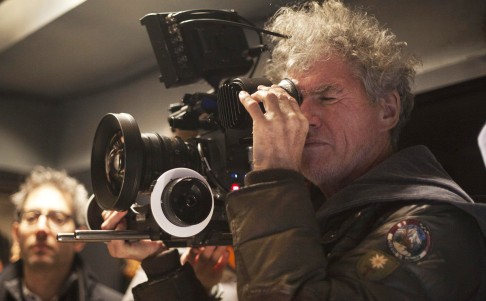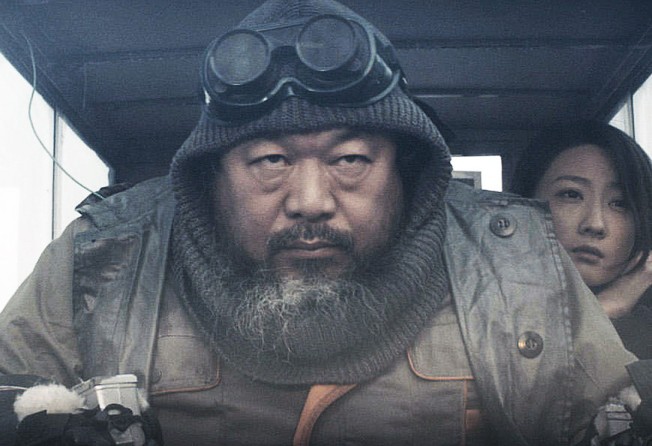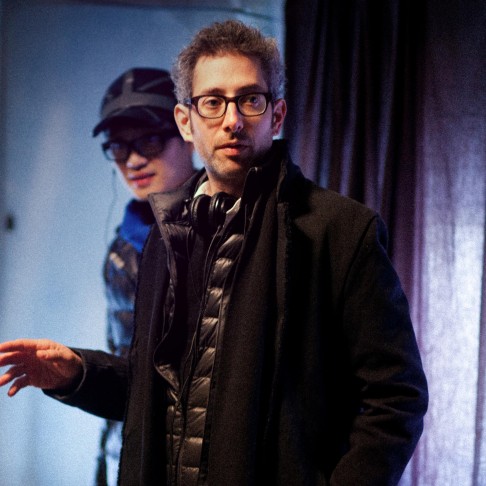
How US director’s film was nearly derailed by a storm with Ai Weiwei
A US director convinced Ai Weiwei to act in his crowdfunded film, but a spat with the artist nearly derailed the project, writes Bernice Chan

In early April, things seemed to be on a roll for director Jason Wishnow. The 40-year-old's yet-to-be released short film The Sandstorm was already receiving international attention, thanks largely to the participation of mainland artist and activist Ai Weiwei, who had agreed to play a cameo role in this dystopian science fiction film about a water shortage. All there was left to do was for the filmmaker to find enough money to complete the non-commercial project.
Like many in the US film industry today, Wishnow turned to crowdfunding for support. Actor Don Cheadle, for instance, was reported to have used his celebrity, together with collaborator Ewan McGregor's star power, to raise enough cash from crowdfunding site Indiegogo to make up the shortfall in their budget for a movie about jazz great Miles Davis. Before that, Spike Lee, Zach Braff and Kristen Bell all used Kickstarter campaigns to help finance films.

On April 23, Ai issued a letter saying he never agreed to be promoted as the star of The Sandstorm and that he never gave the director consent to use his image or name to promote the film. The artist claimed that he only agreed to play a minor role in the 10-minute film.
Watch: Kickstarter video of Ai Weiwei's film The Sandstorm
Wishnow made no immediate response and efforts to contact the Chinese artist met with silence. In early June, Wishnow wrote an open apology to Ai on his Kickstarter site, admitting how he should have taken into account Ai's public image: "Your image and identity are precious, so I should have known better than to take at face value an early conversational nod on your part to make and market this movie as I saw fit … My intention was to honour you, not exploit you."

In the end, the crowdfunding site helped the director raise US$101,065 (HK$784,000), more than triple the original goal. The Sandstorm cost US$90,000 (HK$698,000) to make.
Despite the spat with Ai, Wishnow was able to use crowdfunding to help him realise a work that sets out to raise people's awareness of the damage they do to the environment. He says unlike most films on Kickstarter - that have nothing to show prospective donors - there was already a trailer, and the more money people donated, the more of the making of the film they were able to see.
"In some ways it's a special thing for film aficionados," says Wishnow. "It's like lifting the hood on how films are made and leaves you open to incredible vulnerability because you are letting people see the film being made before you show the finished product."
The New York-based director says crowdfunding also encourages creators to do something in return for contributors. For example, with The Sandstorm, Wishnow says, for US$11 (HK$85), people can see the film one day in advance of it being released for free online; and to those who shell out US$5,000 (HK$39,000), they become an associate producer.
"This turned out to be an incredible way to find out we had fans we didn't know existed. They were our first audience base, much like an audience lining up to see a blockbuster," he says. "People often want to feel engaged in the media they consume."
When Wishnow went to Beijing in 2012, he had just left TED after 6 ½ years working in the video department that archives all the non-profit's TED Talks. "It was time to leave and tell my own story, and I wanted to make a narrative feature film," he says.
A friend had just moved out of an apartment in Beijing and Wishnow occupied it for a few months hoping to develop new projects. He had worked on other short films such as Mister Handsome (2011) and co-directed a documentary about the 2011 tsunami in Japan.
While Wishnow didn't know anyone in Beijing, he had corresponded with people who worked in Ai's studio. The artist had given a TED talk by video in 2011, about how technology helps people to push for a civil society in China.
The American eventually had a meeting with Ai and he wrote on the Kickstarter campaign page that, an hour into their conversation, the artist leaned in close and asked, "What can we do together?" The American grabbed the chance to pitch a sci-fi story set around water shortages.
Wishnow, who invited Hong Kong-based cinematographer Christopher Doyle onboard, began shooting surreptitiously around Beijing, mainly because the authorities are constantly monitoring Ai's movements. "Beijing looks like a futuristic city and then because of the pollution, we didn't need to buy or rent any smoke machines. It was already set for a dystopian atmosphere," says the director.
No release date has been set for The Sandstorm yet. What makes the short film particularly interesting for Wishnow is that the premise of the story, about an environmental disaster, gives him an opportunity to explore those issues subtly.
"It makes it more interesting than a heavy-handed message. What's mesmerised me about China is watching the industrial revolution and internet revolution happening before my eyes. The country has an interesting dichotomy - despite its over-the-top apocalyptic environmental issues, it could be the place to solve energy and environmental problems."